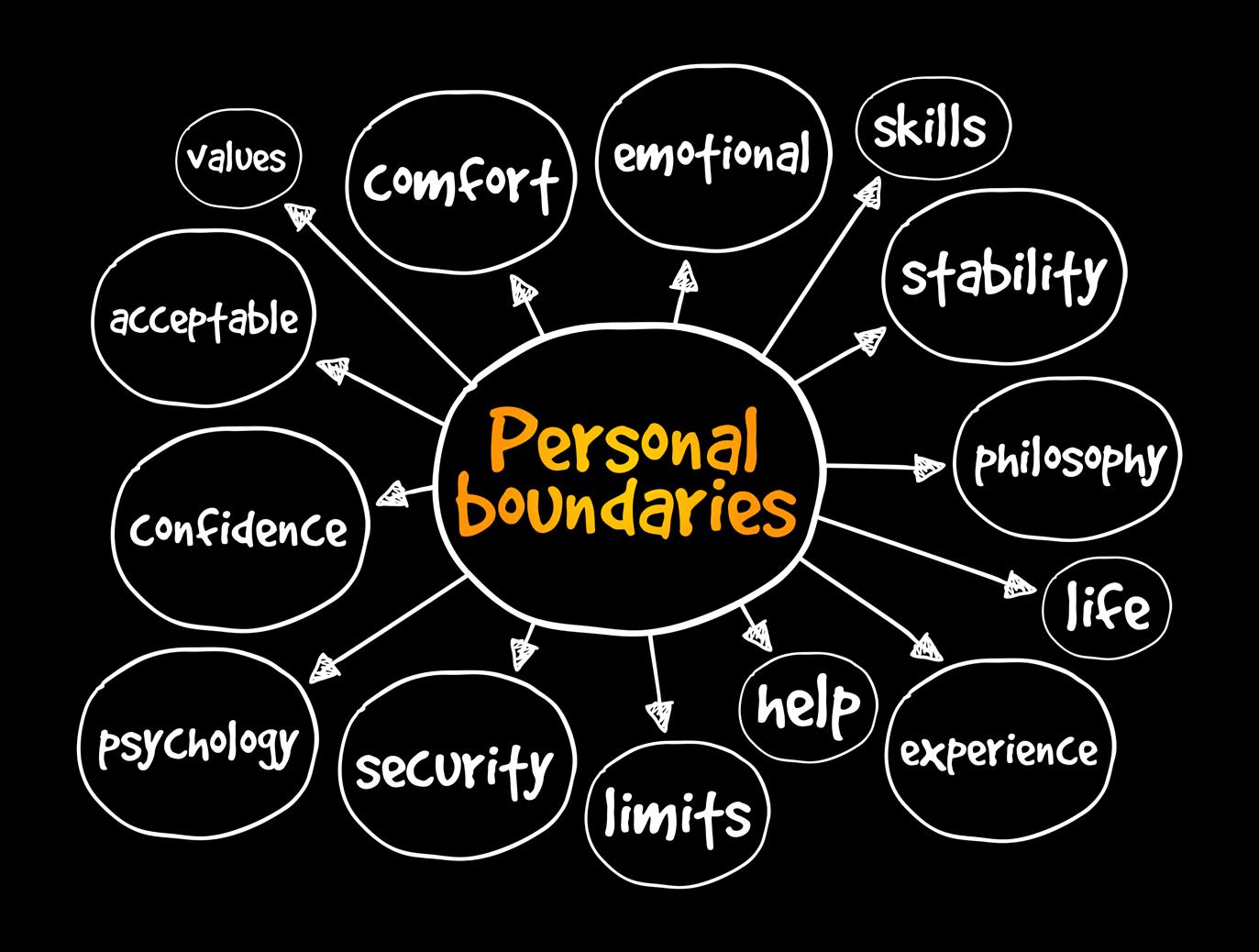
9 minute read
Boundaries: Protecting Yourself and Your Staff
by FVMA
- Candace Boudreau, CVT
Self-care has become a popular topic, a buzz word we’ve heard so often that it fades into the background—but what does self-care actually look like? The first image that comes to mind may be of someone enjoying the solitude of quiet meditation or laughing with a group of friends.
Advertisement
However, self-care isn’t strictly yoga and staff pizza parties; it can be the things we know we should do for ourselves that we put off. It can be paying bills or buying healthy food from the grocery store. It can be declining a social invitation so you can stay home and catch up on rest.
Self-care could be visiting the gym for a workout or sending the kids to Grandma’s house for the weekend. It can be having the difficult conversations. Saying, “I’m sorry, I can’t help you with that,” or “I’m not comfortable with this.” Self-care can look different for different people and depending on context.
I feel confident assuming that anyone reading this already knows that compassion fatigue and burnout are ongoing challenges in veterinary medicine. I’ll go out on a limb and say that many of us in this field struggle with self-care and work-life balance, myself included.
In the past few years, I’ve made a particular effort to develop a healthier lifestyle for myself, both professionally and personally. In doing so, I realized I lacked boundaries. I needed to learn how to set them and how to deal with the guilt that comes along with that. For those in the veterinary community, self-care can largely come in the form of setting boundaries.

Boundaries in Veterinary Medicine
When you think about it, we already operate within the guidelines of boundaries every day. Doctors don’t offer treatment without a doctor-patient relationship. Veterinary technicians can’t diagnose or prescribe. Pre-anesthetic blood work is required for surgery, etc. These protocols that we follow are all examples of boundaries that we set and/or maintain in everyday practice.
It may feel easier to enforce boundaries that are set by others. If those are the rules as they were told to us, and since we don’t make them—we just follow them, then we may feel less of a responsibility to those who are upset by them. However, when we are setting our own boundaries, we could be more likely to internalize that guilt when the client is upset. We may also be more likely to bend our own rules because there is no higher authority for us to answer to.

When comes to dealing with burnout, I imagine the Snickers’ commercials that say: “You’re not you when you’re hungry.” You’re not you when you’re burned out. You’re not you when you keep pushing yourself beyond your limits. I know it’s tempting because you want to help as many pets as you can, but you also need time to recharge.
Look at quality as well as quantity: You may see 40 pets in a day, but were you able to spend adequate time with each of them? Did you feel like you were functioning at your highest level? Or were you fatigued, rushed, just pushing yourself through to get to the end of the day?
The truth is you need to take care of yourself in order to effectively care for others. Time to rest, relax and recharge is vital to not only your well-being but also your ability to function. Veterinary professionals may be superheroes, but even superheroes need to take a break sometimes. Superman isn’t always Superman, sometimes he’s just Clark Kent.
Setting Boundaries: Don’t Be Afraid
An important realization for me, in regards to boundaries, was the understanding that it is not my responsibility to manage other people’s emotions. In fact, I couldn’t even if I tried. In the past, my ability (or willingness) to set boundaries was crippled by a fear of others’ reactions.
I didn’t want to hurt them; I didn’t want to make them unhappy. I didn’t want to be viewed as cruel or uncaring. The truth is those people who push back against your boundaries are often the people you need to protect yourself from the most.
This realization can be difficult but also freeing. The only emotions that belong to me are my own and the only reactions to emotions that I can control are my own. It is not my responsibility to bend my boundaries for the sake of others. If you lose business because you won’t accommodate someone beyond what you are comfortable with, chances are they’re doing you a favor.
I was once given the advice that you “teach people how to treat you,” meaning that what we accept from others—or where we draw the line with them—gives them an idea of how we will respond to things in the future; what their dynamic with us will be. This can be applied to relationships in both personal and professional settings.
We learn new things from our experiences all the time, adding new information to our schemas that color how we see the world. Our interactions with others also teach us a great deal about how to behave. If someone in your life feels that they can be demanding of your time and resources, there is a good chance they will continue to do so.
For example, that client who walks in without an appointment time again and again. Each time, they watched you go beyond reasonable accommodations to fit them in. To them, if it worked the first time, it will work the second time, and the third time, and so on. When someone is abusive to your staff and gets away with it, it’s only a matter of time before it happens again. You can be kind and compassionate, while still saying “no” and drawing the line in the sand.
Recognizing Your Own Value
Another hard pill to swallow is the fact that self-worth should not be based on the ability to do for others. I love going above and beyond for others.
I can admit to having something deep down inside of me that lights up when I know I’m truly helping someone, and I often assign value to myself based around my ability to do so. I strive to improve the lives of the humans and animals around me, and when I’m able to gain that sense of accomplishment, I’m floating in the clouds.
However, the yin to this yang is that when I don’t help someone, I can easily feel like a failure and even a “bad” person. I have recognized this and started working toward a healthier self-image. One where I have inherent value as a person, regardless of what I do or don’t do for others.
Every person has value (yes, even you). You are made standard with this value, it’s not an upgrade; it is part of you. Nobody should have to bend over backwards for others in order to earn it. No one is obligated to be available 24 hours a day, seven days a week, to anybody.
Sure, you could try… but it isn’t sustainable.
Nobody can keep that up forever without serious negative repercussions. Being nice is not synonymous with being passive and it doesn’t have to mean that you never assert yourself. Part of knowing your value is remembering that you have the right to stand up for yourself and say when you’re not comfortable with something.
When you realize your value, you can then begin to trust yourself. Remember when I talked about boundaries sometimes being easier to maintain when they belong to someone else? One component of that may be a lack of trust in ourselves and our own judgement.
When you trust yourself, you can try to listen to what your mind and body are asking for. When you’re feeling run down, trust that you need rest. When you’re feeling taken advantage of, trust that those feelings are rooted in reality. When you’re feeling uncomfortable with a situation, trust that your concern is valid and setting a boundary that you are comfortable with is the right thing to do.
We are all different people with different opinions and different levels of comfort. Because of this, it would be nearly impossible to establish one standard set of boundaries and apply them to everyone. You know yourself best. Trust that your needs are legitimate. Your own unique boundaries are just as important as anyone else’s.
Self-care Is Not Selfish
I know these concepts may be simple, but sometimes the simplest concepts are the most difficult to put into practice. When you find yourself struggling, as I often do, try to remember that taking care of yourself is not selfish—and it isn’t cruel.
You deserve a healthy work-life balance and you deserve to put yourself first. If you take the same compassion you afford to others and turn it inwards towards yourself, you just might change your whole world. In the words of my favorite podcaster, marriage and family therapist, Dr. Kirk Honda, “take care of yourselves because you deserve it, you really, really do.”
About the Author

Candace is a graduate of the veterinary technology program at St. Petersburg College in Florida and is a certified veterinary technician in the Tampa Bay Area. She also holds a bachelor’s degree in psychology from the University of South Florida, St. Petersburg.
Candace is a member of the Florida Veterinary Medical Association’s Professional Wellness & Wellbeing Committee and is QPR certified in suicide prevention. In her free time, she enjoys writing, cooking, traveling and changing song lyrics to make the song about her dog, Sadie.




